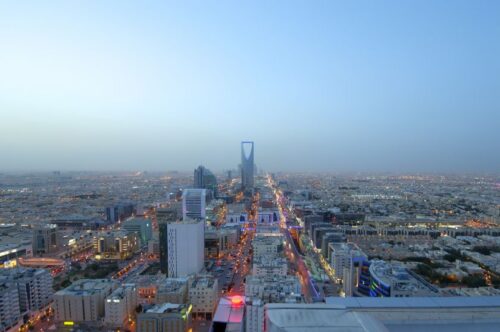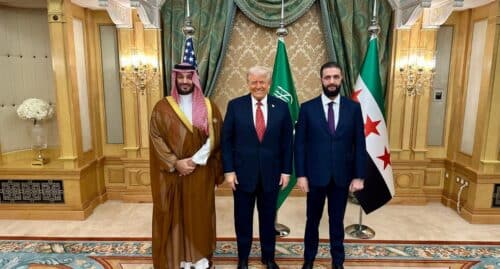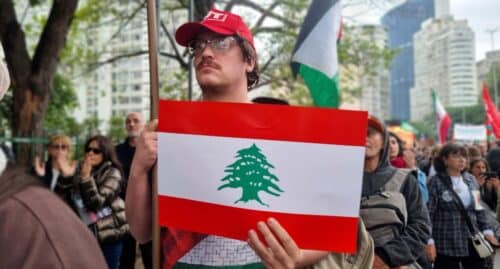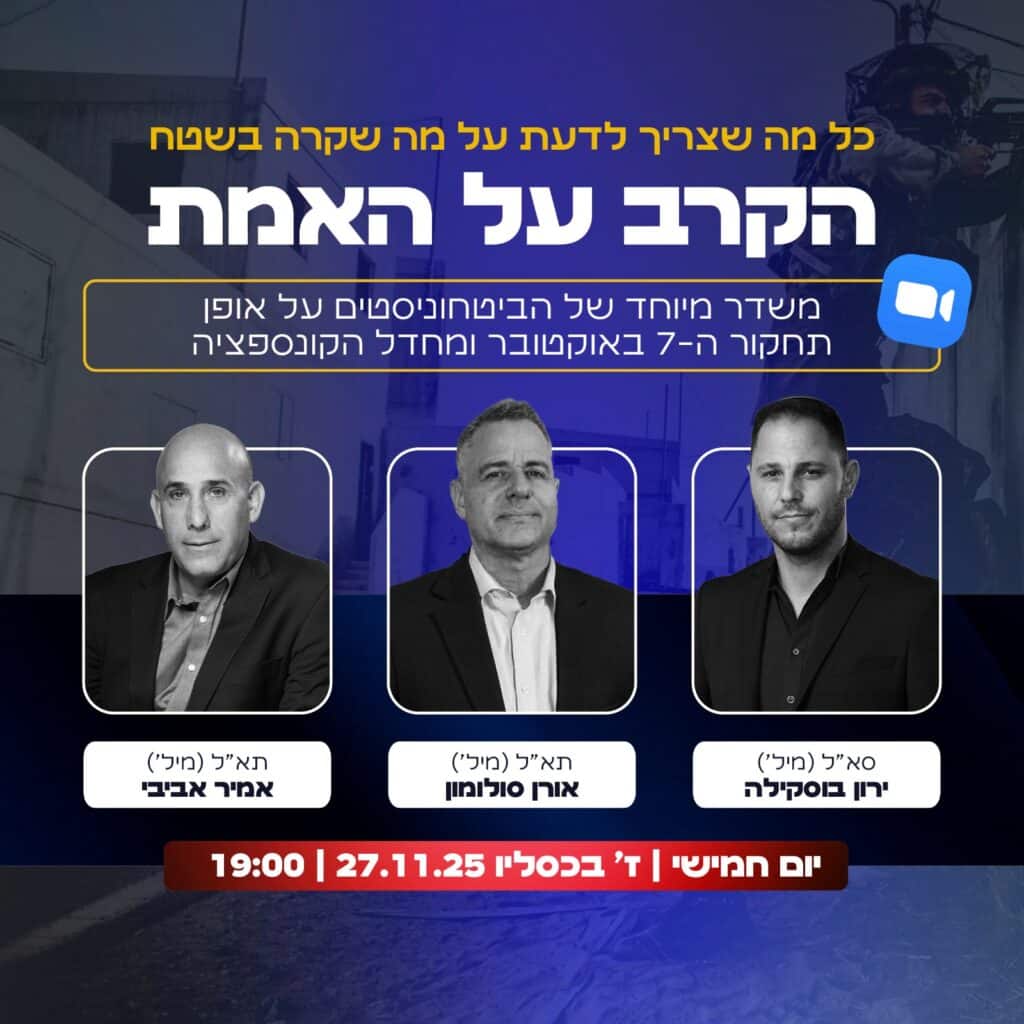During his 38 years of service in the IDF, Major-General (res.) Gershon Hacohen participated in multiple wars and military operations, commanded thousands of soldiers and took part in crucial events that have helped shape Israeli society. Although Hacohen’s opinions, ideologies and worldviews have changed over the years, there are two things that have remained constant: He has always said exactly what he thinks and he always keeps his word, continuing to do so even after retiring from the IDF. He is also invited regularly to speak on TV news programs, where he offers his opinion on security matters in a clear and unapologetic manner.
As everyone knows, guests are not given much time to speak on news programs. Sometimes, they are expected to explain a long and complicated philosophy in just one sentence, which is not enough for viewers to understand the complexity of the issues. In an effort to learn about these issues, we sat down with Hacohen so we could hear his opinions about the war in Ukraine, what lessons we here in Israel can learn from it and how all of this is connected to a land that speaks.
“In our region, we cannot afford to be naïve, and in fact that would even be dangerous.”
Gershon Hacohen is a member of the research department at IDSF-Habithonistim (Israel’s Defense & Security Forum), and was involved in the writing of the Ukraine Model policy paper, which offers a number of lessons from the Russia-Ukraine war that we can learn from, as well as recommendations for the future. Two examples of lessons we can learn is firstly, that it is in Israel’s best interest to retain pragmatic and stable relations with Russia in light of its role in the region, and secondly, that despite the unmatched significance of Israel’s strategic partnership with the United States, under no circumstances should Israel rely on foreign forces for its national security, even friendly and important ones. Dependence on international guarantees has been once again called into question during the war in Ukraine.
Gershon, let me ask you: There are good people and bad people in the world. Why would it be better to maintain relations with bad people, seeing as that could harm our relations with the good ones?
It’s easy to take the moral high ground when you are situated high up in an ivory tower, where you don’t face dilemmas that have actual consequences. In reality, life is much more complex than the good guys against the bad guys. In the Torah, it is written that ‘Noah was a righteous man he was naïve in his generations.’
Later on, in the description of his life, the word naive was not used, and Noah remained only righteous. What happened? Someone who lives in an immoral society, who survived a flood that covered all the land, who has seen the world getting destroyed, can no longer be perfect or naive.
How did we draw a line from Noah to the United States and China?
Listen, in our neighborhood, in this geo-political region, we cannot afford to be naïve – in fact it would be quite dangerous for us. So, to answer your question, I believe that we must protect the State of Israel’s interests at all costs, even if that means maintaining a good working relationship with China, which could perhaps endanger Israel’s relationship with the US in some way.
Has China become Israel’s new ally?
No, not at all. But there’s no doubt that we must accept the fact that China is a significant world power. What kind of relationship do we have with China, you ask? Nothing more than looking out for our own interests.
Can the same thing not be said with respect to the Americans?
No. Israel and the US have a common set of values that far surpasses purely looking out for our country’s best interests. Anyone who knows the history of the United States knows that it was established by people who went there to build a new world. Their founding fathers were immigrants and pioneers with values from the Old Testament. So, in this respect, the Americans have a great deal in common with the Jewish People, and the journey we experienced in the Revival of Israel.
The main point is, that even if it appears that it is an issue of the good guys against the bad guys, and there is great significance to which countries you support morally, there are other considerations that are even more critical. At the end of the day, the security of the State of Israel is our main focus. This lesson is explained at length in the Ukraine Model policy paper.
Can you please explain this a little more in depth?
We don’t need to look further than the way countries in the West have been interacting with Ukraine to understand that each country does what’s in its own best interests. How have all the pacts and agreements Ukraine had signed with the West helped them now? They’ve been begging for aid, help and support – all of which are clearly stipulated in these agreements – but has this helped them at all? No. In the end, each country does what it needs to do to protect its security interests, and that’s how Israel should act, too. The most important thing is that the security situation in the State of Israel will remain stable.
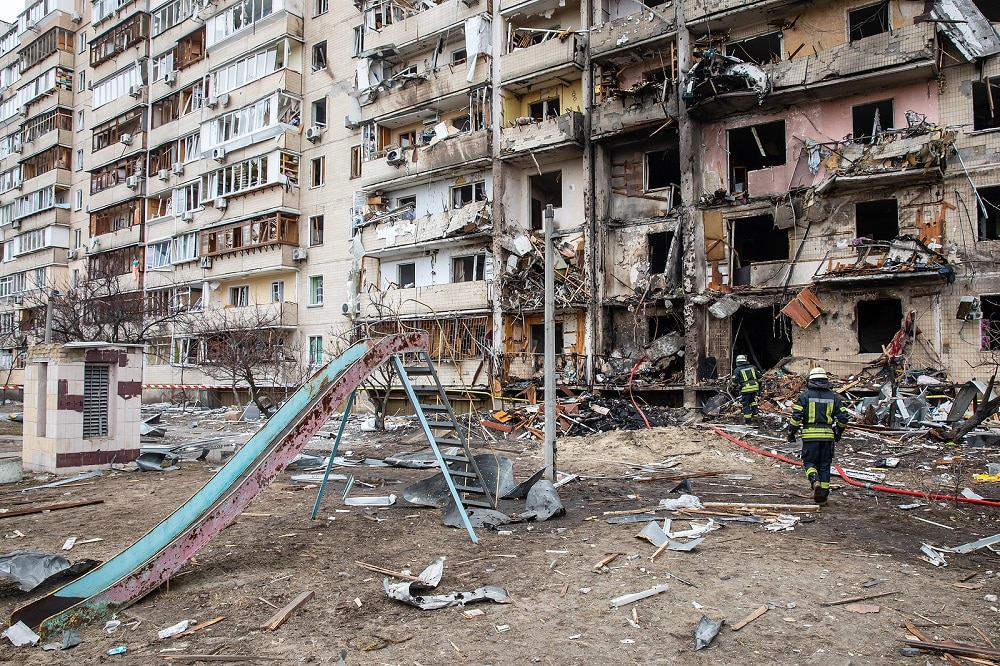
The IDF is Not Enough: Even 80-Year-Old Men Can Hold a Gun
In addition to the importance of maintaining Israel’s security and its ability to protect itself without outside support, we can learn another lesson from the Ukraine Model: The importance of having a people’s army when reserve units need to be called up in a time of war. The need to be well prepared for the possibility of war breaking out is well instilled in Israeli public consciousness. According to a survey carried out by IDSF-Habithonistim’s research department, the Israeli public feels that it is not properly prepared for military confrontation. Only 50% of those surveyed believe that the IDF combat units on the front line are prepared for a military confrontation. And what is even more disturbing is that only 30% believe that Israel’s home front – its civilian backbone – is prepared for domestic riots. When we look at what is happening now in Ukraine, we cannot help but imagine what would happen if an enemy state attacked Israel and its citizens were required to take up arms to protect themselves.
How can we prepare ourselves for the day when neighboring countries surrounding us might attack us?
It’s very simple actually. We need to arm ourselves fully and place our troops all along our borders. This is the only way we will succeed in protecting ourselves.
What kind of logistics would that involve?
What that means is that even Israeli citizens living on Moshav Shtula near the Lebanon border, for example, will arm themselves. The way things stand today, in an emergency situation, 90% of Israeli men will find themselves sitting in shelters. That is an absurd situation, and we need to change that so we can make use of all the available manpower for fighting. Citizens need to be armed and we need an active national guard. Yes, even a man who is 80 years old can hold a gun.
Wait a minute – are you saying that the IDF is not enough?
I am exceptionally familiar with the details of the IDF’s manpower capabilities, and I can clearly say: The IDF is not enough. The IDF’s ability to carry out offensive attacks is categorically dependent on a situation in which it does not need to protect every single city or community at the same time in a time of war. In Canada, for example, there are farms that are completely isolated, with kilometers of empty land surrounding them. According to Canadian law, these farms are required to always keep in stock a whole list of items, such as medicine and food. This law is meant to ensure that in an emergency, rescue teams would not need to be sent out to these outlying areas throughout the country. In the same way, if war were to break out in Israel, the IDF would not be capable of protecting all of the communities on Israel’s northern border all at once. That would completely quash the IDF’s ability to focus on the large, truly critical war events.
So, does that mean that civilians and soldiers would be fighting side by side?
Of course! Just look at what has been going on in Ukraine. What, in your opinion, led to the Ukrainian army’s ability to withstand Russian attacks so successfully? You cannot distinguish between successes by the army and by citizens, or between what was the result of having quality military equipment or strong nationalistic consciousness and determination. In a time of war, everything becomes intertwined. You don’t know where one thing stops and the next begins. The Ukrainian army, which has received military intel from the Americans and the British, is the force that is preventing the Russians from achieving their goal. But they are succeeding only as a result of help from Ukrainian women who concoct homemade Molotov cocktails and civilians who volunteer in building street barricades. These brigades are staffed by soldiers and civilians who are working together.
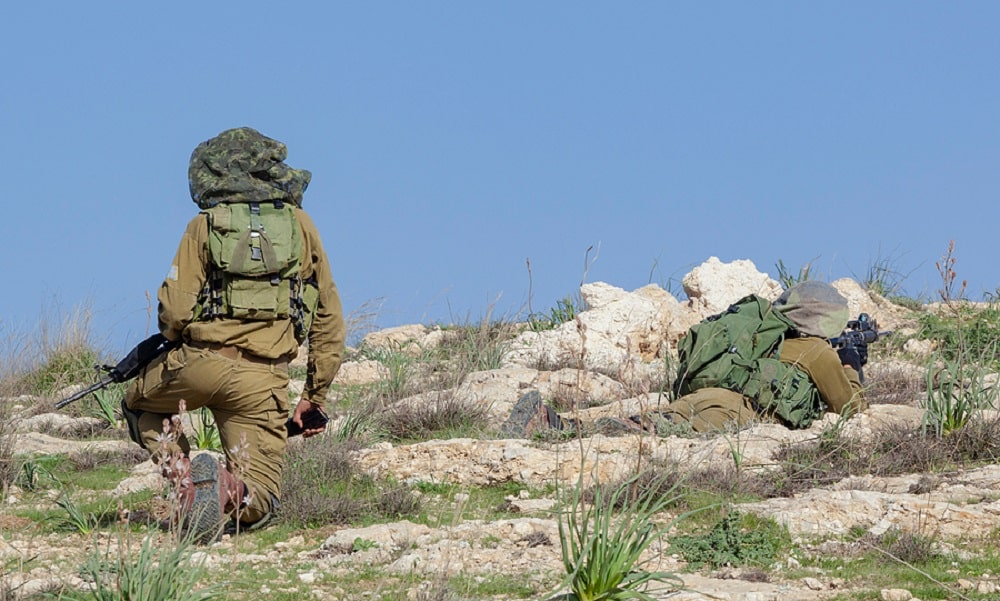
Philosophy and Reality: “The Land Needs to Speak to the Young People”
Hacohen has a bachelor’s and a master’s degree in comparative literature and philosophy. Not many officers serving in the IDF who have taken off time during their service for academic study have chosen these fields of study. The reasoning behind this decision, Hacohen explains, is that according to him, philosophy is the deep analysis of the essence of life and of the reality in which we live. Since completing his studies and retiring from the IDF, Hacohen has been focusing his efforts on national security, and has even published a book titled, “What’s National in National Security?”
Can you please explain the title of your book?
Sure. But first you need to understand that there are two fundamental questions that are not often asked together when discussing national security. The first one is, how do we protect our existence? And the second question is, what is the purpose of our existence? These two questions are totally interdependent, and we cannot ask the question about how we can protect our existence without being able to also answer the second question regarding our purpose, and vice versa. These two questions are completely dependent on each other.
This sounds like a deep philosophical statement. Can you give an example?
In April 1948, David Ben-Gurion stood up in front of the Jewish establishment’s military leaders and announced that he had decided to fight for Jerusalem. In practice, what this meant was that troops would have to be removed from the northern border and transferred to the Jerusalem region. Ben-Gurion declared that this was going to be the plan of action, regardless of what the price would be in human capital. And let me tell you that price was indeed quite high. Kibbutz Masada was razed to the ground, Moshav Mishmar Hayarden was destroyed, as was Kibbutz Sha’ar Hagolan. And not to mention all the casualties in and around Jerusalem: Over 400 residents of Jerusalem were killed, and one-third of the 4,000 Jewish combatants who lost their lives during the War of Independence fell during fighting in the Jerusalem area.
What does this have to do with the two questions regarding existence?
Let’s examine Ben-Gurion’s decision: According to the first question – How do we protect our existence? – we would have reached the conclusion, and justifiably so, that the decision to transfer troops to Jerusalem was incorrect. Hundreds of people – residents and soldiers – were killed in the resulting skirmishes. Is that how a country protects it existence? The answer is that Ben-Gurion’s declaration, which put the lives of civilians and troops in danger, was not made only according to the question of how do we protect our existence, but also according to the second question: What is the purpose of our existence? As Ben-Gurion himself said: “If a land has a soul, then Jerusalem is the soul of the Land of Israel.”
This is a beautiful story of an event that took place over 70 years ago. In your opinion, does the younger generation of IDF combat soldiers feel like they are defending their home?
That depends on how you define the last word of your question: Home. Yes, it’s hard to imagine a future if a person only loves the home that exists within the four walls of his own house. If we are to be able to paint a picture of our future, we must first understand that home is much more than our own personal house – home is our homeland, and we need to live with the feeling that every centimeter of Israel is our home. In other words, the land needs to speak to the younger generation, too.
What does that mean, that land needs to speak to the younger generation?
The following story will help make it easier to understand: Yaakov Hazan, who was a leader of the Mapam political party, once described an incident that took place when he was doing training on a farm overseas. One day, Yaakov saw the farmer kneeling down with his ear to the ground. When Yaakov asked him why he was doing that, the farmer said he was listening to the land, and he suggested that Yaakov try it too. So, Yaakov put his ear to the ground, but he didn’t hear anything. The farmer said, of course you don’t hear anything – it’s not your land. Yaakov ends his story with the following: ‘Since I returned to Israel, every once in a while, I put my ear down to the ground and I hear the land talking to me.’ IDSF-Habithonistim is working arduously so that the younger generation will hear the land speaking to them. So that they will feel that it belongs to them, too.
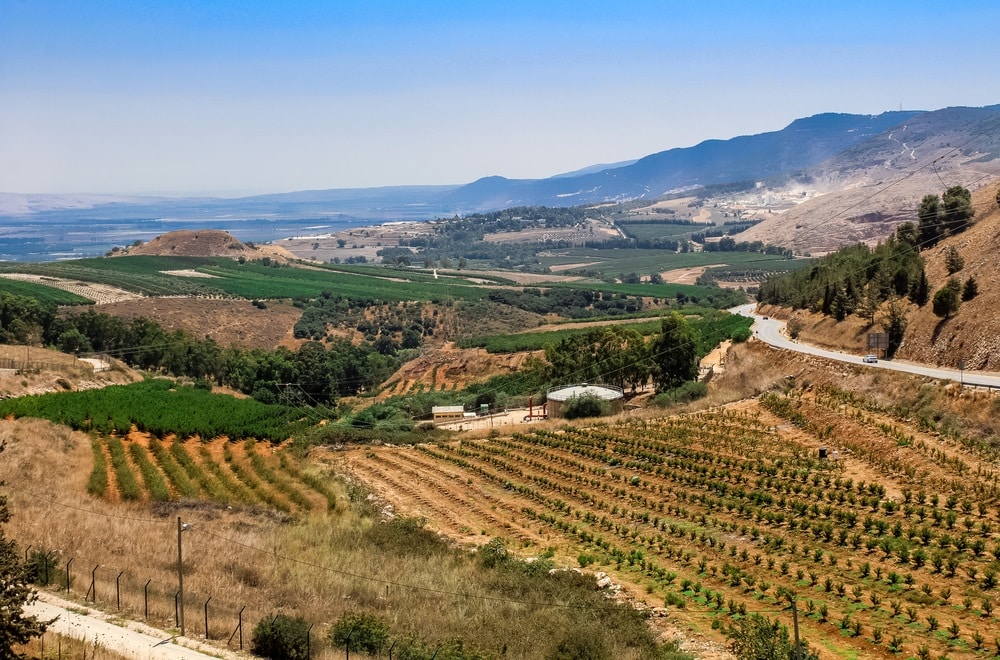
Since The Era of Ben-Gurion and Yaakov Hazan, Much has Changed. But there Is Also Plenty that Remains the Same
Phrases such as ‘The Soul of Jerusalem’ and ‘The Ground Speaks to Me’ belong to the generation of the founders of the Modern State of Israel. We asked Gershon Hacohen if these words still hold meaning in the so-called bourgeois Israel of 2023.
Is this kind of thinking still relevant in today’s Israel?
Absolutely. And I’ll tell you something else – We need to completely overhaul the way we are living here Israel . What’s the average Israeli’s dream nowadays? To live in a fancy condo with a sea view. But that is not the realization of the Zionist dream. We need to spread out across the land as much as possible, and plant fields, not stay high up in an ivory tower. Not only would this help Israel strategically, but it would also help us get in touch with the culture and physicality of our homeland.
Are you suggesting that the State of Israel go back to being an agriculture-based society?
I don’t view it as ‘going back.’ Even the most developed countries in Europe understand that it is necessary to retain a certain amount of agricultural industry, that it is not healthy to turn all of the land into urban centers. Take Germany for example. Two-thirds of German citizens live outside of the cities. And many people who work in industries and hi-tech in a city have a plot of land out in the country with plans to return there – to work their land – after they retire.
With all due respect, this does not sound like something that could jumpstart Israel’s economy.
That’s true, but why should that matter? If we want to help Israelis become deeply connected to their land, then we should be willing to pay the price for that, even if it’s not economical. The biggest difference between a person who is connected to the land and someone who is not, is the connection between their identity and the place where they live. In Israel, this connection is critical, since we are in the midst of a conflict that involves our land. It is imperative that we feel the connection between our identity and our land.
Is it so critical that it is worth putting a strain on Israel’s economy?
If we are not willing to pay a price for this, we will have an even bigger problem on our hands. It is exactly this national component that is missing from our national security strategy. Only nations that have a strong connection to their land, that are willing to fight over it and overcome the hardships are capable of surviving in the long term. Our goal at IDSF-Habithonistim is to educate our youth that the State of Israel is the national home of the Jewish People and the basis for our lives here.
How do you go about doing that?
We go often to speak with young people at military preparatory programs and bring up for discussion topics such as the importance of Jewish identity, the State of Israel and the IDF for combat soldiers in the modern era. Members of IDSF-Habithonistim travel all over Israel, engaging with participants at every pre-army program that is interested, regardless of their political or religious orientation, so we can spread our message.
Can you could sum up in a few sentences what is the most important action we can take in order to keep Israel secure for future generations?
We need to return to focusing on the ‘national’ aspect of national security strategy. In other words, we need to listen to the land, and really hear what it is saying. We need to ask not just, How can we protect our existence, but also, What is the purpose of our existence. This is the only way we will be prepared for the next round of war. IDSF-Habithonistim is doing everything in its power to make this happen. In addition to speaking with youth at military preparatory programs, we are also engaged in a tremendous amount of outreach at schools, as well as with decision-makers in the defense establishment and the media, in an effort to promote this worldview. Without nationalism, we have no security.



